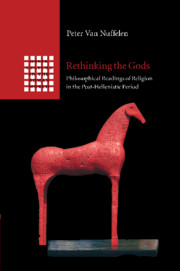Book contents
- Frontmatter
- Contents
- Acknowledgements
- Abbreviations
- Introduction
- Part I Ancient wisdom
- Part II Cosmic hierarchy
- Part III Polemic and prejudice: challenging the discourse
- Chapter 9 Lucian, Epicureanism and strategies of satire
- Chapter 10 Philo of Alexandria
- Chapter 11 Celsus and Christian superstition
- Epilogue
- Bibliography
- Index
Epilogue
from Part III - Polemic and prejudice: challenging the discourse
Published online by Cambridge University Press: 05 December 2011
- Frontmatter
- Contents
- Acknowledgements
- Abbreviations
- Introduction
- Part I Ancient wisdom
- Part II Cosmic hierarchy
- Part III Polemic and prejudice: challenging the discourse
- Chapter 9 Lucian, Epicureanism and strategies of satire
- Chapter 10 Philo of Alexandria
- Chapter 11 Celsus and Christian superstition
- Epilogue
- Bibliography
- Index
Summary
This book started out from the perspective of the history of philosophy, taking as its point of departure the tendency of Post-Hellenistic philosophy to open itself up to external sources of authority and knowledge. This ‘opening up’ must be qualified, however, in an important sense: religion is reinterpreted with the aim of conveying authority to one's own philosophical position. Although philosophers from different doctrinal allegiances draw on the discourse of ancient wisdom or use hierarchical images such as that of the Great King, they can still argue for widely diverging positions on the basis of it: Plutarch found in Egyptian mythology his own peculiar kind of Platonist metaphysics, whereas for Chaeremon it was pure Stoicism. The image of the Great King visualises in On the World an Aristotelian conception of the divine, but in Maximus of Tyre it is advanced to prove a resolutely Platonist one. Religion is thus an external source of knowledge, but not an independent one: it is domesticated by philosophical interpretation before being allowed to enter the argument.
In opening up to religion, Post-Hellenistic philosophy develops a hermeneutics of tradition that allows it to integrate religion into the philosophical argument. The importance attached to religion as a source of truth is evidenced in the tendency to rank it higher than poetry, as we noted for example in Plutarch and in Dio Chrysostom's Borystheniticus. The recent appeal of S. Goldhill to give religion its due place in the study of the literature of the Imperial period is therefore more than welcome: the focus in scholarship on literary culture or technical philosophical arguments may miss much of what this period was about.
- Type
- Chapter
- Information
- Rethinking the GodsPhilosophical Readings of Religion in the Post-Hellenistic Period, pp. 231 - 241Publisher: Cambridge University PressPrint publication year: 2011

